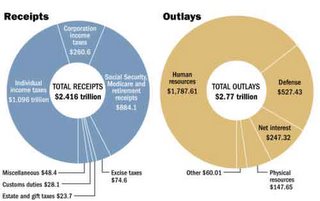A few charts
 This is gonna be just a quick hit and run, but this is some stuff I've been peeved about for some time, it's just the right graphic hadn't come around yet to expound on it. The above chart is Festus's 2007 budget showing what's changed from last year.
This is gonna be just a quick hit and run, but this is some stuff I've been peeved about for some time, it's just the right graphic hadn't come around yet to expound on it. The above chart is Festus's 2007 budget showing what's changed from last year.Notice the fifth largest category is the interest paid on the federal deficit. $247 billion is a substantial piece of change and would probably pay for half of what a Universal heath care program would cost if we had one. The thing to underscore here is that this is exactly like credit card interest. The thing you bought with the money you spent is long gone and used up, but you have to pay the vig on it for years after. That makes every thing you bought that much more expensive. It's a stupid way to spend tax dollars.
The Third highest expense that oddly exceeds the rate of inflation is the increase in unemployment benefits. The unemployment rate has been trending down for the last few years so this number should be a lot lower. One more factoid that suggests the unemployment numbers are as concrete as Festus's Iraqi WMDs.
I won't even go into the categories on the bottom of the list that are going in the negative direction such as environment, housing, education and social services. It's a Republican government after all.
 Next up is Receipts and Outlays. I remain aghast that corporate income taxes account for barely 10% of the 2.4 trillion the Feds take in. That number just feels wrong to me and it seems likely that it should probably be double that percentage.
Next up is Receipts and Outlays. I remain aghast that corporate income taxes account for barely 10% of the 2.4 trillion the Feds take in. That number just feels wrong to me and it seems likely that it should probably be double that percentage.Note again what a large portion of outlays the interest on the debt is. There are grown sane men with doctorates in economics that actually argue that the size of the federal deficit is irrelevant because taxpayers only owe themselves that money which makes it a wash. The men are morons. Note that the increase in interest is 12% over last year, far larger than the annual increase in GDP of 4%.
Hmmm, that can't be good. How can you grow the economy out of debt with tax cuts when the increase in debt service exceeds the growth of the economy?

<< Home